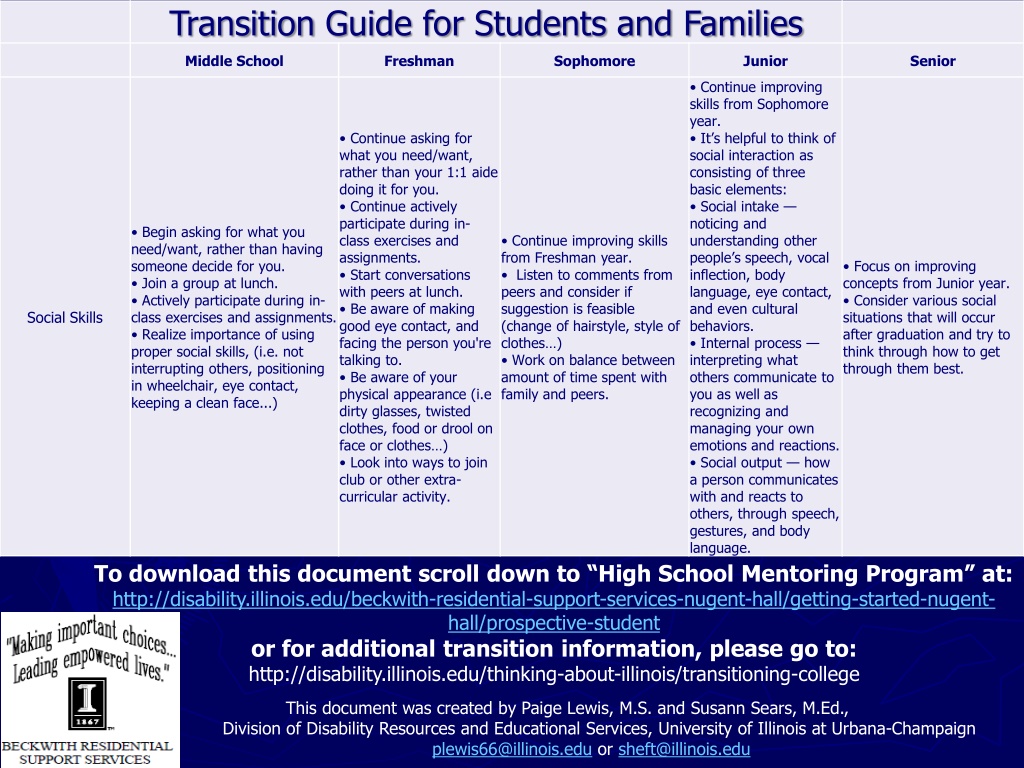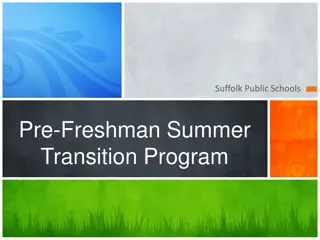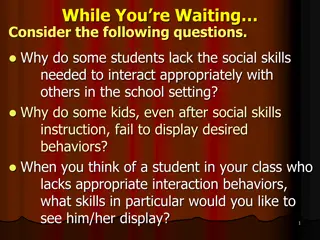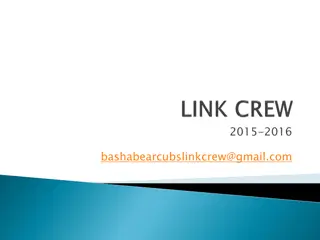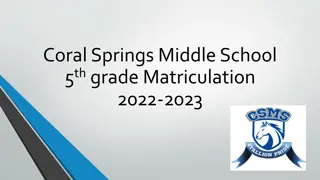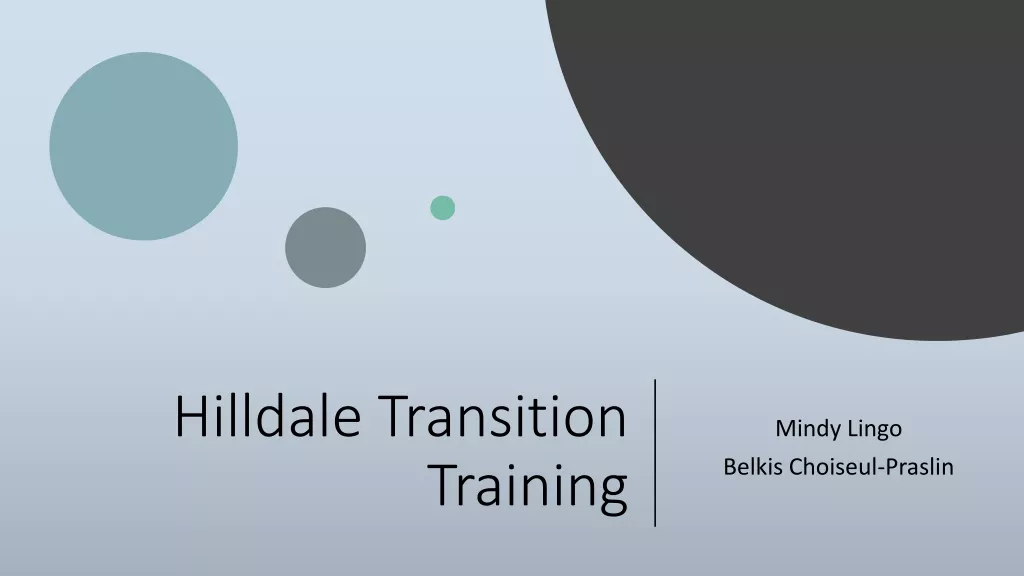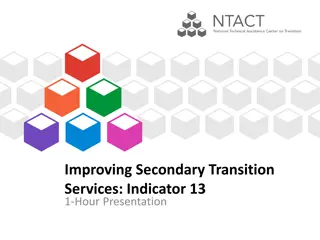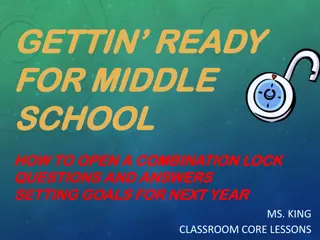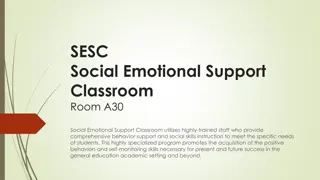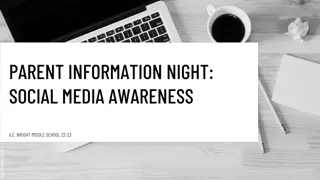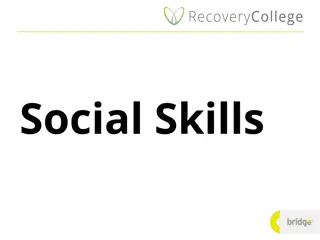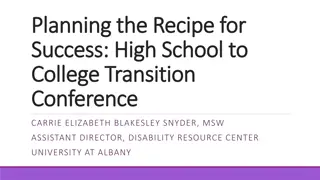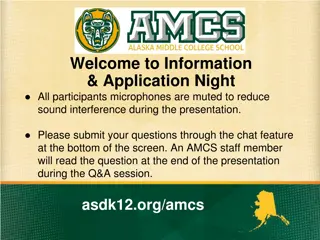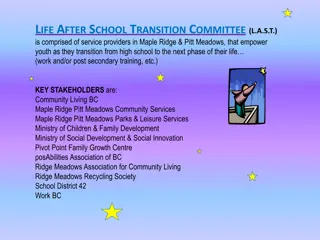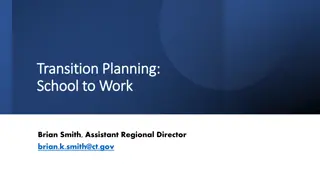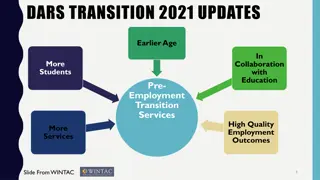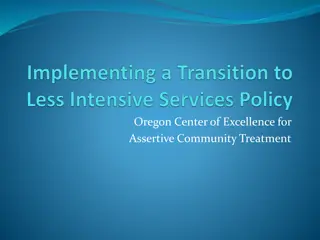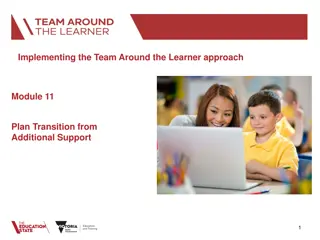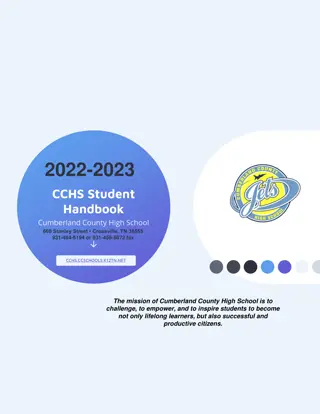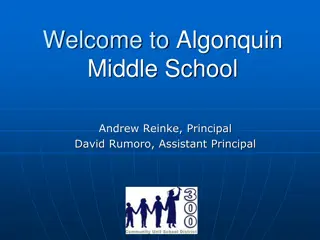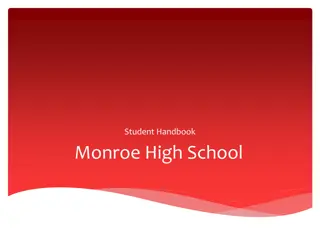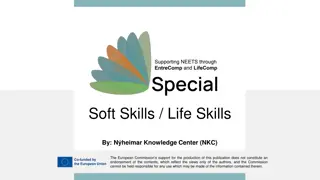Social Skills Development Guide for Middle to High School Transition
Improve social skills by focusing on social intake, internal processing, and social output. Take initiative in social interactions, participate actively in activities, maintain good appearance, and join clubs. Work on balancing time with family and peers, consider future social situations, and enhance communication skills. Develop responsibility, set boundaries, manage tasks efficiently, and anticipate academic involvement in high school. Explore assistive technology options and seek support for acquiring necessary tools. Continuously improve coping skills and adapt to new technologies.
Download Presentation

Please find below an Image/Link to download the presentation.
The content on the website is provided AS IS for your information and personal use only. It may not be sold, licensed, or shared on other websites without obtaining consent from the author. Download presentation by click this link. If you encounter any issues during the download, it is possible that the publisher has removed the file from their server.
E N D
Presentation Transcript
Transition Guide for Students and Families Middle School Freshman Sophomore Junior Senior Continue improving skills from Sophomore year. It s helpful to think of social interaction as consisting of three basic elements: Social intake noticing and understanding other people s speech, vocal inflection, body language, eye contact, and even cultural behaviors. Internal process interpreting what others communicate to you as well as recognizing and managing your own emotions and reactions. Social output how a person communicates with and reacts to others, through speech, gestures, and body language. Continue asking for what you need/want, rather than your 1:1 aide doing it for you. Continue actively participate during in- class exercises and assignments. Start conversations with peers at lunch. Be aware of making good eye contact, and facing the person you're talking to. Be aware of your physical appearance (i.e dirty glasses, twisted clothes, food or drool on face or clothes ) Look into ways to join club or other extra- curricular activity. Begin asking for what you need/want, rather than having someone decide for you. Join a group at lunch. Actively participate during in- class exercises and assignments. Realize importance of using proper social skills, (i.e. not interrupting others, positioning in wheelchair, eye contact, keeping a clean face...) Continue improving skills from Freshman year. Listen to comments from peers and consider if suggestion is feasible (change of hairstyle, style of clothes ) Work on balance between amount of time spent with family and peers. Focus on improving concepts from Junior year. Consider various social situations that will occur after graduation and try to think through how to get through them best. Social Skills To download this document scroll down to High School Mentoring Program at: http://disability.illinois.edu/beckwith-residential-support-services-nugent-hall/getting-started-nugent- hall/prospective-student or for additional transition information, please go to: http://disability.illinois.edu/thinking-about-illinois/transitioning-college This document was created by Paige Lewis, M.S. and Susann Sears, M.Ed., Division of Disability Resources and Educational Services, University of Illinois at Urbana-Champaign plewis66@illinois.edu or sheft@illinois.edu
Transition Guide for Students and Families Freshman Sophomore Continue improving skills from Freshman year. Learn to take on more responsibility. Make sure you're diligent about completing chores/tasks without being asked repeatedly. Continue with following personal limitations and boundaries regularly. Middle School Junior Senior Decide what additional weekly chores you will do. Think through how to solve simple issues on your own first before asking for help. Set personal limitations and boundaries and try to follow them. Continue improving skills from Sophomore year. Increase level of detail of schedule as you get more involved academically Anticipate how long it will take to complete assignments and a lot enough time. Continue improving skills from Junior year. Begin to think about situations next year and how you'll adjust to them (i.e no 1:1 aide, inclement weather, wheelchair or other technology problem ). Decide what weekly chores you will do. Do not change boundaries to make things easier. Coping Begin or continue trying products. Put out your best effort while training/learning how to use the program even though it might be frustrating. Reach out to Dept. of Human Services and school district for funding of these items. Keep trying/looking at other products incase one might be better than what you are currently using. Continue improving skills from Junior year. Discuss newer technology with Dept. of Human Services Counselor and acquiring this technology for permanent use. Transfer voice files from school computers to new equipment before graduation. Ask questions during college visits about what Assistive Technology services they support (i.e. text conversion, dragon naturally speaking for exams...). Continue improving skills from Sophomore year. Begin talking to DHS Counselor about their ability to assist with getting you products that you belong to you, not the school. Ask questions during college visits about what Assistive Technology services they support (i.e. text conversion, dragon naturally speaking for exams...) Consider possible products that would help you to be more independent with studies or interacting with peers (i.e. cell phone, notebook, use of apps or programs. Discuss possible assistive technology products that IEP/504 team can provide. Continue improving skills from Freshman year. Use assistive technology to complete more things (personal/school related) on your own. Talk with others who use the same products to learn the tricks of making it easier or faster. Assistive Technology Continue improving skills from Junior year. Planning your day can help you accomplish more and feel more in control of your life. Write a to-do list, putting the most important tasks at the top. Keep a schedule of your daily activities to minimize conflicts and last-minute rushes. Review Module 4 under H.S. Mentoring at: www.disability.illinois.edu/beckwit h-residential-support-services- nugent-hall/getting-started- nugent-hall/prospective-student for any final tips. Continue improving skills from Freshman year. Begin managing schedule on a calendar or on the computer. Keep track of assignments, activities Break habit of keeping track of everything in your head. Continue improving skills from Sophomore year. Look at places where you can volunteer that are interesting - great for college/ employment applications. Continue journaling and review past entries to see how much you've improved. Recognize that time management is simply --- managing your life more efficiently. Explore other ways of keeping track of assignments (tape recorder, smart pen i.e. livescribe ). Begin wearing a watch to manage your time. Keep track of assignments and other commitments in a planner or calendar. Time Management
Transition Guide for Students and Families Middle School Transition Guide for Students and Families Middle School Freshman Sophomore Junior Senior Freshman Sophomore Junior Senior Continue improving skills from Junior year. Keep running your IEP meeting and follow through with transition plans. Continue to complete items on plan or revise if necessary. Review Module 4 under H.S. Mentoring at: www.disability.i llinois.edu/beck with- residential- support- services- nugent- hall/getting- started-nugent- hall/prospective -student for any final tips. Continue improving skills from Junior year. Continue journaling and review past entries to see how much you've challenged yourself. Continue speaking up if you do not agree or think something is incorrect. Continue improving skills from Sophomore year. Learn and practice various problem-solving strategies. Be confident that you can deal with a lot of situations on your own using these strategies. Look into volunteering and then figure out what you need to do to be successful. Work on those skills, and once you have them begin with the volunteer experience. Discuss ability to use a cell phone . Direct the way to familiar places. If you make a wrong turn, try to figure out mistake on your own. Have thoughtful discussion about likes and dislikes. Begin having conversations with family about being more independent with money. Begin trying different cell phones that you can manage independently Discuss in more detail ways of dealing with getting lost. Select at least one thing that you want to do on your own. Discuss all the steps for you to achieve your goal. Follow or modify plan. Continue improving skills from Junior year. Discuss various safety scenarios that might occur next year and identify how to avoid them. Increase self- awareness of high risk or potentially dangerous situations. Request more responsibility with volunteer or paid work experience as appropriate. Continue improving skills from Freshman year. Learn not to assume all comments are directed towards your disability Learn how to identify and avoid being taken advantage of. Try different ways to easily keep track of assignments and appointments that you can do on your own. Continue improving skills from Sophomore year. Lead IEP meetings and discuss your transition plans in detail- be prepared to explain why Make a plan of what you think you need to succeed. When appropriate, speak out on topics of interest. Continue improving skills from Freshman year. Be active contributor in IEP meeting begin talking about transition post- graduation. Be active part of MD visits Know Identify and describe disability using proper terms. Self-Identify where assistance is needed. Attend IEP meetings, comment when appropriate. Begin paying more attention in medical visits, and with issues pertaining to personal care. Participate in IEP Meetings. why you take each medications, you should explain how you feel, not your parent. Executive Skills Self- Advocacy Continue improving skills from Junior year. Weigh the pros and cons of your choices and be ready to accept consequences. Review Module 2 under H.S. Mentoring at: disability.illinois.e du/beckwith- residential- support-services- nugent- hall/getting- started-nugent- hall/prospective- student for any final tips. Learn and practice various problem- solving strategies. Be confident that you can deal with a lot of situations on your own using these strategies. Consider will exert if you don t handle a problem right away and it gets worse. Continue improving skills from Freshman year. Push yourself to handle more situations on your own. Think about the amount of energy (mental, emotional, and physical) that you Continue improving skills from Sophomore year. Continue journaling and review past entries to see how much you've challenged yourself. Speak up if you do not agree or think something is incorrect. Having students try out a new activity. Have student make all plans for a family outing. Go do the outing as planned, and discuss afterwards. Begin journaling your thoughts, either manually or electronically. Continue improving skills from Freshman year. Step out of comfort zone (i.e. increasing level of socialization, going to different places and hanging out ) Continue journaling and Continue improving skills from Sophomore year. Pay more attention to your over all health and wellness play an active role in managing this daily. Start to work out situations with the help of parents/ teachers. Be involved with planning how much you will be assisted by 1:1 aide. consequences before dealing with a specific situation. Become active in at least 1 extra- curricular activity. Continue journaling and read past entries to see differences. review past entries to see how much you've challenged yourself. Problem Solving Self- Confidence
Transition Guide for Students and Families Middle School TransitionGuide for Students and Families Middle School Freshman Sophomore Junior Senior Freshman Sophomore Junior Senior Student needs to make choice for leading an empowered life, even when it is hard. Talk about what colleges interest you and go on college visits. Student should make a list of what they need, want and desire to get out of college. Update how each college visit stacks up to your list. Continue improving skills from Junior year. Continue with leisure activities. Look into resources for stress management at colleges of interest. Review Module 4 under H.S. Mentoring at: www.disability.il linois.edu/beck with-residential- support- services- nugent- hall/getting- started-nugent- hall/prospective -student for any final tips. Ask yourself the following questions: What are my care needs? When do I need help? Night? Day? Morning? 24/7? How many people cover my needs? When hiring, consider what your PA expectations might be? Is gender a consideration? What personal qualities do I want my PAs to have? Try to only use 1:1 aide for toileting this year. After 18th birthday, apply as an independent as with the Dept. of Human Services.-Voc Rehab and Home Services. Apply for Social Security benefit at: ssa.gov Apply for scholarships/ other financial aid/grants. Continue making empowered decisions. Keep updating your college visit checklist after each visit. Student should lead discussions during college visits, not parents. Review and update the list from your college visits when making decision of where to go next year. Continue improving skills from Sophomore year. Consider how personal and academic support will change after high school. Utilize 1:1 aide less than last year. Get used to directing all of your support at home and at school. Student takes primary role training 1:1 aide and other staff at school. Continue improving skills from Freshman year. Continue improving knowledge of how to lead an empowered life. Student should begin considering college options, if they haven't already. Student needs to be able to be given the chance to fail and learn how to have a better result the next time. Play an active role in deciding what services you really need at school. Feel okay with asking questions. Discuss what it means to be entitled and empowered. Decide which one you want to be entitled or empowered and why. Begin paying attention to ways you need to be helped at home and at school. Do as much as you can for yourself when possible. Get in the habit of directing how you are being helped. Continue improving skills from Freshman year. Utilize 1:1 aide less than last year. Take more active role in discussion of ADL needs and how they are done at home. Include in IEP/504 option for limiting role of 1:1 aide. Develop plan and actively work on skills to achieve that goal daily. Get used to asking a friend to help with easy tasks. Empowerment- Entitlement PA s Think about why you feel stressed. Think about how you can control how angry or frustrated you get. Keep that strategy in your mind, and try using it the next time you get mad. Were you able to control it better? How did you feel afterwards? Continue improving skills from Sophomore year. Learn to take on more responsibility. Continue with leisure activity. Continue focus on improving decision- making skills, Look into a leisure activity that can help with stress release (Tae Kwon Do, Relaxation Techniques, Meditation, video games, sports ) Continue working on controlling your anger, because only you can do so. Continue improving skills from Freshman year. Continue with leisure activity. Review How to Develop Your Decision Making Skills at: www.hooah4hea lth.com/spirit/de cisions.htm# as this will decrease stress. Follow-up with your local Dept. of Human Services about eligibility and steps for applying after turning 18. Keep researching potential scholarships local, national and specific for students with disabilities. Continue improving skills from Freshman year. Begin researching scholarships that you might be eligible for in two years. Initiate discussion with Dept. of Human Services (DHS) to see if your family is able to receive any support with you being a dependent. Stress Work with DHS and your school district on funding of assistive technology and personal assistants if necessary. Management Financial Assistance
